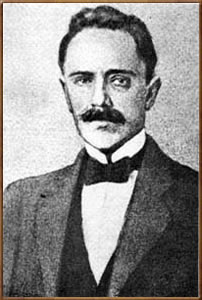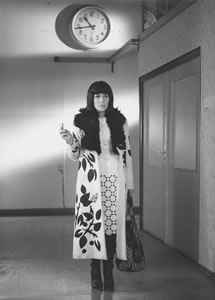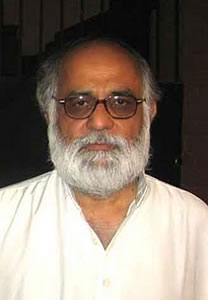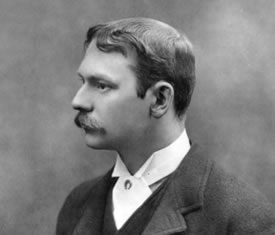De Litouwse schrijver en vertaler Jurgis Baltrušaitis werd geboren op 2 mei 1873 in Paantvardys.
TO THE FAVORITES OF VIOLENCE
Let the headsman’s black axe sever
The thread of life the Highest spun;
Immortal thought it will not bring to ruin,
The spirit’s life it may not take!
In time’s delirium, smoking, scarlet
Before the Hour’s Prince, time on time
The flow of blood has stained the Colosseum.
That for the ages Love might flower.
Such is the law for aye unbroken
In all that life has brought to pass:
On earth the right is with the persecuted,
The judge is always put to shame.
Kingdoms have guttered, and in quiet
Sleeps their might, their fleeting play;
But timeless gleams a morning – glow in darkness, –
The light that shines from Huss’s pyre…
In stern malevolence, O hangman
Of spirit, revel in your toil;
But he who tries to crush the Word’s wise babble,
Shall bring down lightnings on his head!
Vertaald door W. Edward Brown
LITTLE DAISY
Little daisy, white as snow,
To delight me as I tread,
From the roadside dust you grow,
Lifting up your pretty head.
Under sorrow’s weight I groaned;
Your sweet flower healed my sore.
In the world I’m not alone,
Not an orphan any more.
Poverty seems to be gone,
Gone the pain, and life seems worth
Living – not like exile on
This dark, melancholy earth.
With sunshine you filled my heart,
And I walk along, made bold
By the song bereft of art
You left singing in my soul.
Vertaald door Dorian Rottenber

Jurgis Baltrušaitis (2 mei 1873 – 3 januari 1944)
De Duitse schrijfster Gisela Elsner werd geboren op 2 mei 1937 in Nürnberg.
Uit: Die Zähmung
„Trotz der herabgelassenen Sonnenrouleaus war die Hitze, die im Krankenhaus herrschte, so unerträglich, daß sich Giggenbacher immer wieder mit einem feuchtem Waschlappen den Schweiß von der Stirn, von seinem Hals und von seinen Handflächen wischen mußte. Obwohl er dieses stickige Krankenzimmer liebend gern verlassen hätte, blieb er auf dem Besuchersessel sitzen, dessen Kunstlederbezug an seinem Gesäß klebte. Denn er fürchtete, daß es Bettina, die von der Geburt ihres Töchterchens noch zu geschwächt war, um zu der Grünanlage zu gehen, die das riesige Krankenhaus umgab, auf einen Mangel an Vaterliebe zurückführen würde, wenn er nicht wartete, bis die kleine Josephine, die man ihm bereits hinter einer Glaswand vorgeführt hatte, zum Stillen hereingebracht wurde.
Verstohlen schaute er auf seine Armbanduhr, ehe er mit dem Gefühl, daß die Zeit lähmend langsam verstrich, einen Schluck des dünnen lauwarmen Kaffees trank, den eine schlitzäugige Schwester vor einer Weile zusammen mit einem Stück Napfkuchen auf den Nachttisch gestellt hatte, auf dem drei Bücher lagen, deren Titel Die Psyche des Säuglings, Das Kleinkind als gleichberechtigter Partner und Das Kind als Erzieher seiner Eltern lauteten. Er wagte es nicht, sich einzugestehen, daß er nicht das Bedürfnis hatte, sein Töchterchen an diesem Tag noch einmal zu sehen. Er wagte es auch nicht, sich einzugestehen, daß es ihn enervierte, beim Anblick der kahlköpfigen, zahnlosen Josephine, die wie die übrigen Säuglinge im Säuglingszimmer etwas greisenhaftes an sich hatte, Entzücken heucheln zu müssen, um Bettina nicht zu enttäuschen, deren Glückseligkeit von einer Hysterie beeinträchtigt wurde, die er beunruhigend fand. Während er sie stirnrunzelnd musterte, stellte er fest, daß ihre Miene schon wieder einen ängstlichen Ausdruck angenommen hatte.
Ich hätte unser Kind nicht in diesem Krankenhaus zur Welt bringen dürfen, sagte sie.
Bist du mit den Schwestern nicht zufrieden, erkundigte sich Giggenbacher.”

Gisela Elsner (2 mei 1937 – 13 mei 1992)
De Oostenrijkse schrijver Franz Innerhofer werd geboren op 2 mei 1944 in Krimml.
Uit: Ein Nachruf auf den österreichischen Schriftsteller Franz Innerhofer (door Johannes Birgfeld)
“Er überlegte, ob es nicht sinnvoller wäre, einfach zu gehen, einfach durch die Nacht zu gehen, irgendwo würde er umfallen, sagte sich aber wieder, das sind ja nur Menschen, warum soll ich mich wegen ihnen umbringen?” Franz Holl, der diese Zeilen denkt, ist ein Junge von dreizehn oder vierzehn Jahren, irgendwann gegen Ende der fünfziger Jahre. Er lebt in einer Touristenidylle, im österreichischen Oberpinzgau, am Fuße der Hohen Tauern, schön aber ist sein Leben ganz und gar nicht. Er ist das uneheliche Kind eines Almbauern und einer Landarbeiterin, und das nimmt der Vater, bei dem er lebt, zum Anlass, ihn nach allen Regeln der Kunst zu erniedrigen, zu misshandeln und schließlich als kostenfreie Arbeitskraft auszubeuten.
Seit seinem sechsten Lebensjahr verbringt Holl jede freie Minute und oft auch jene Stunden, in denen er in der Schule etwas lernen sollte, mit unfreiwilliger Landarbeit: Pferde müssen geführt, Kühe gemolken, Herden über die saftigen Almwiesen getrieben, Holz aus Wäldern gezogen oder Heu gemäht, gewendet und eingeholt werden. Der Bauer ist in seinen Forderungen rücksichtslos. Wie die anderen Knechte und Mägde wird das Kind systematisch geprügelt, beschimpft und seelisch gebrochen. Es ist die Hölle, in der Holl bis zu seinem sechzehnten Lebensjahr lebt, von niemandem geliebt, ohne Freunde, ein Bettnässer, ein Prügelknabe, der alles falsch macht, ein Hoffnungsloser in einem Bauern-KZ.
Als mit dem Beginn der sechziger Jahre auch in den hintersten Almwinkeln Österreichs das Industriezeitalter beginnt, hat Holl Glück. Er ist alt genug, die neuen Traktoren zu fahren, und weil ihre Steuerung ihm leicht fällt, wird der Bauer von ihm abhängig. Holl gelingt es, sich zu emanzipieren, und es beginnt ein abenteuerlicher Aufstieg: Schnell verlässt er den Hof und lässt sich zum Schmied ausbilden. Bald wird ihm das jedoch zu eintönig und er erwirbt das Abitur an einer Abendschule, während er tagsüber in Werkstätten arbeitet. Es folgt ein Studium und schließlich gar ergreift Holl die Feder und wird Schriftsteller. Doch da heißt er schon nicht mehr Holl, sondern Lambrecht, und eigentlich Franz Innerhofer.

Franz Innerhofer (2 mei 1944 – 19 januari 2002)
Zie voor de drie bovenstaande schrijvers ook mijn blog van 2 mei 2007 en ook mijn blog van 2 mei 2008 en ook mijn blog van 2 mei 2009.
De Sindi schrijver Jamal Abro werd geboren op 2 mei 1924 in in Sangi, een klein dorpje in Mehar Dholka, toen een deel van het District Dadu. Jamal Abro bezocht een aantal scholen in Larkana en Hyderabad en deed zijn toelatingsexamen aan de universiteit van Bombay in 1941. In 1944 ging hij naar Bengalen en werkte als vrijwilliger in opvangkampen in door hongersnood getroffen gebieden. Hij werkte ook als een activist voor de Khaksar Movement. Abro behoorde tot de generatie van Sindhi schrijvers die aan het literaire front verscheen onmiddellijk na de onafhankelijkheid. Abro’s eerste korte verhaal werd gepubliceerd in 1949 en werd gevolgd door een aantal anderen. Pishu Pasha leidde tot veel debat en discussie. Onder deze naam was een collectie van bijna een dozijn korte verhalen verschenen in 1959. Er volgde een lange schrijvers pauze. Een uitnodiging om een verhaal te dragen voor een universitair magazine was aanleiding om na vijftien jaar weer een verhaal te schrijven.
Uit: Pirani
“The mother broke down, her heart crushed, her very vitals cut into pieces. She screamed, Pirani, oh, my little Pirani! The girl shrieked back…
The Brohis were coming down from the hills. The winter had just set in. The cold, dry wind was sweeping down the dust and the gravel ahead of them . They had two or three bullocks and one camel. Two dogs with wagging tails followed them. The men were barefooted, their shalwars(trousers) short and torn.
On their heads they wore conical, embroidered caps full of dust and dirt. The women donned long robes with pretty embroidered designs now shredded and fa ding away as a result of long wear.
On the bullocks they had loaded huge sacks full of twine and ropes twisted out of goat s hair. The young children sat huddled on the sacks, the parents driving the animals with their sticks as they kept humming, Hee, hoon, hee, honn…. with their beards they looked handsome and dignified, but penury-stricken and weather-bitten.
They pitched their camp on a secluded spot where they distributed pieces of dry bread. From another cloth bag they took out some lumps of dried curd which they put in pitchers full of water. Each one gulped down a few draughts.
Little Pirani, hardly nine years old, clapped her hands as she cried, We are now in Sindh! “We will have such good things and so many!” Her father took off his cap and scratched his head full of lice. The mother looked annoyed. Other children were also dreaming of the good and sweet things awaiting them on the plains. In the valley of Sindh, they built for themselves small shacks made of hay.”

Jamal Abro (2 mei 1924 – 30 juni 2004)
De Duitse schrijfster Angela Krauß werd geboren op 2 mei 1950 in Chemnitz. Zie ook mijn blog van 2 mei 2007 en ook mijn blog van 2 mei 2008 en ook mijn blog van 2 mei 2009.
Uit: Weggeküßt
`Im Zoo wird es uns vorgeführt: wir werden erwartet.
Die Tiere stehen in ihren Gattern da und sehen uns entgegen. Wird ihnen Futter gebracht, fressen sie sofort, um gleich darauf wieder ihre wartende Haltung einzunehmen. Manche laufen vor kribbelnder Erwartung rastlos auf und ab, steigen ein Treppchen hinunter, drehen sich, und gleich wieder hinauf: der Brillenbär. Dick ist er und bietet doch einen Anblick der Rastlosigkeit, er eilt einer bestimmten Stelle zu, wo ihm jedesmal einfällt, daß er an einer anderen etwas vergessen hat, worauf er kehrtmacht, um es zu holen. Ist er am Ziel, fällt ihm ein, er hat dort, woher er kam, wieder etwas vergessen, was ihn veranlasst, eiligst umzukehren. Wiederum am Ziel, erinnert er sich des Vergessenen am letzten Ausgangspunkt, er kehrt sofort um. Obwohl zwischen beiden Endpunkten seiner Vergeßlichkeit dieses Treppchen eingebaut ist, zeigt er keinerlei Merkmale von Erschöpfung.
So vertreibt sich der Brillenbär die Wartezeit.`

Angela Krauß (Chemnitz, 2 mei 1950)
De Amerikaanse (toneel) schrijver Clyde Fitch werd geboren op 2 mei in 1865 in Elmira, New York. Zijn vader moedigde hem aan om een architect te worden of te kiezen voor een carrière in het bedrijfsleven, maar zijn moeder had altijd geloofd in zijn talent als schrijver. Fitch is afgestudeerd aan het Amherst College in 1886, waar hij lid was van Chi Psi Fraternity. Hij was de eerste Amerikaanse toneelschrijver die zijn toneelstukken publiceerde. Zijn eerste werk van betekenis was Beau Brummel (1890) dat een glansrol voor acteur Richard Mansfield opleverde die de titelrol zou spelen voor de rest van zijn leven. In 1900 maakte Captain Jinks of the Horse Marines een ster van Ethel Barrymore. Fitches werken waren populair aan beide zijden van de Atlantische Oceaan. In 1896 schreef Fitch de teksten voor een populaire song Love Makes The World Go ‘Round.
Uit: The Girl With The Gtreen Eyes
„_Three smart-looking SERVANTS are peering through the crack of the
folding door, their backs to the audience. The pretty, slender MAID
is on a chair. The elderly BUTLER dignifiedly stands on the floor.
The plump, overfed little HOUSEMAID is kneeling so as to see beneath
the head of the BUTLER._
HOUSEMAID. [_Gasping._] Oh, ain’t it a beautiful sight!
BUTLER. [_Pompously._] Not to me who ‘ave seen a Lord married in Hengland.
MAGGIE. Oh, you make me sick, Mr. Potts, always talking of your English Aristocracy! I’m sure there never was no prettier wedding than this. Nor as pretty a bride as Miss Jinny.
BUTLER. [_Correcting her._] Mrs. Haustin!
HOUSEMAID. She looks for all the world like one of them frosted angels on a Christmas card. My, I wish I could ‘a’ seen her go up the aisle with the organ going for all it was worth!
MAGGIE. It was a _beautiful_ sight!
BUTLER. A good many ‘appens to be ‘aving the sense to be going now.
HOUSEMAID. Could you hear Miss Jinny say “I do,” and make them other remarks?
MAGGIE. Yes, _plain_, though her voice was trembly like. But Mr. Austin he almost shouted!“
[Laughing nervously in excitement._
BUTLER. ‘E’s glad to get ‘er!
MAGGIE. _And her him!_
HOUSEMAID. Yes, that’s what I likes about it. Did any one cry?
MAGGIE. Mrs. Tillman. Lots of people are going now.
HOUSEMAID. What elegant clothes! Oh, gosh!
BUTLER. [_Superciliously._] Mrs. Cullingham don’t seem in no ‘urry; she’s a common lot!
MAGGIE. I don’t care, she’s rich and Miss Jinny likes her; she just
throws money around to any poor person or church or hospital that wants it, or _don’t_! So she can’t be so _very common_ neither, Mr. Potts!“

Clyde Fitch (2 mei in 1865 – 4 september 1909)
De Schotse schrijver John Galt werd geboren in Irvine op 2 mei 1779. Zijn vader was kapitein op een schip. De familie trok in 1789 naar Greenock, waar Galt zijn eerste essay’s voor lokale tijdschriften schreef. In het jaar 1804 verhuisde hij naar Londen, waar hij vanaf 1809 rechten studeerde. Galt reisde veel en raakte bevriend met George Gordon Byron. In de jaren van 1824 tot 1829 verbleef hij in Canada, waar hij de Canada Company oprichtte. Na een conflict met de gouverneur Peregrine Maitland werd hij gevangengezet. In 1833 ging Galt terug naar Greenock, waar hij in 1839 overleed.
Uit: The Life of Lord Byron
“The English branch of the family of Byron came in with William the Conqueror; and from that era they have continued to be reckoned among the eminent families of the kingdom, under the names of Buron and Biron. It was not until the reign of Henry II. that they began to call themselves Byron, or de Byron.
Although for upwards of seven hundred years distinguished for the extent of their possessions, it docs not appear, that, before the time of Charles I., they ranked very highly among the heroic families of the kingdom.
Erneis and Ralph were the companions of the Conqueror; but antiquaries and genealogists have not determined in what relation they stood to each other. Erneis, who appears to have been the more considerable personage of the two, held numerous manors in the counties of York and Lincoln. In the Domesday Book, Ralph, the direct ancestor of the poet, ranks high among the tenants of the Crown, in Notts and Derbyshire; in the latter county he resided at Horestan Castle, from which he took his title. One of the lords of Horestan was a hostage for the payment of the ransom of Richard Cœur de Lion; and in the time of Edward I., the possessions of his descendants were augmented by the addition of the Manor of Rochdale, in Lancashire. On what account this new grant was given has not been ascertained; nor is it of importance that it should be.
In the wars of the three Edwards, the de Byrons appeared with some distinction; and they were also of note in the time of Henry V. Sir John Byron joined Henry VII. on his landing at Milford, and fought gallantly at the battle of Bosworth, against Richard III., for which he was afterwards appointed Constable of Nottingham Castle and Warden of Sherwood Forest. At his death, in 1488, he was succeeded b
y Sir Nicholas, his brother, who, at the marriage of Arthur, Prince of Wales, in 1501, was made one of the Knights of the Bath.”

John Galt (2 mei 1779 – 11 april 1839)
De Engelse schrijver Jerome Klapka Jerome werd geboren op 2 mei 1859 in Walsall, in het toenmalige graafschap Staffordshire. Zie ook mijn blog van 2 mei 2009.
Uit: Three Men on a Boat
“There were four of us—George, an William Samuel Harris, and myself, and Montmorency. We were sitting in my room, smoking and talking about how bad we were—bad from a medical point of view I mean, of course.
We were all feeling seedy, and we were getting quite nervous about it. Harris said he felt such extraordinary fits of giddiness come over him at times, that he hardly knew what he was doing; and then George said that he had fits of giddiness, too, and hardly knew what he was doing. With me, it was my liver that was out of order. I knew it was my liver that was out of order, because I had just been reading a patent liver-pill circular, in which were detailed the various symptoms by which a man could tell when his liver was out of order. I had them all.
It is a most extraordinary thing, but I never read a patent medicine advertisement without being impelled to the conclusion that I am suffering from the particular disease therein dealt with in its most virulent form. The diagnosis seems in every case to correspond exactly with all the sensations that I have ever felt.”

Jerome K. Jerome (2 mei 1859 – 14 juni 1927)
Zie voor onderstaande schrijvers ook mijn blog van 2 mei 2007.
De Duitse schrijver en dichter Klaus Konjetzky werd geboren op 2 mei 1943 in Wenen.
